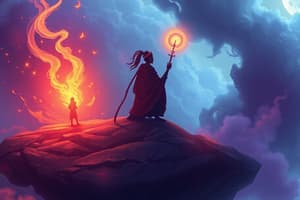Podcast
Questions and Answers
What influenced the development of Hindi during the 18th and 19th centuries?
What influenced the development of Hindi during the 18th and 19th centuries?
- Portuguese missionaries
- Arabic vocabulary from trade interactions
- Persian language under Mughal rule (correct)
- French colonization
In which branch of the Indo-Aryan family of languages does Hindi fall?
In which branch of the Indo-Aryan family of languages does Hindi fall?
- Eastern
- Dravidian
- Western (correct)
- Central
What were some of the languages that influenced the development of Hindi according to different sources?
What were some of the languages that influenced the development of Hindi according to different sources?
- Japanese and Korean
- Sanskrit, Prakrit, and Apabhramsa (correct)
- German and Dutch
- Spanish and Italian
During which historical era did Hindi become more similar to the English language?
During which historical era did Hindi become more similar to the English language?
What differentiated Sanskrit from other Indian languages according to some arguments?
What differentiated Sanskrit from other Indian languages according to some arguments?
What language family does Hindi belong to?
What language family does Hindi belong to?
Which of the following is NOT a widely spoken dialect of Hindi?
Which of the following is NOT a widely spoken dialect of Hindi?
What type of script is Devanagari?
What type of script is Devanagari?
How many consonants are there in the Devanagari script?
How many consonants are there in the Devanagari script?
Which of the following languages is NOT written in the Devanagari script?
Which of the following languages is NOT written in the Devanagari script?
What is the language family that Hindi belongs to?
What is the language family that Hindi belongs to?
In which of the following areas does Hindi play a significant role, according to the text?
In which of the following areas does Hindi play a significant role, according to the text?
Flashcards are hidden until you start studying
Study Notes
Introduction
Hindi is a widely spoken language in India and has a significant impact on the country's culture, literature, and entertainment industry. This article explores the history of Hindi, its classification, and how it evolved into a modern language. Unlike many languages with complex etymology, Hindi originated from different regional dialects, which developed over time due to cultural interactions and political shifts.
History of Hindi
Historically, Hindi was not recognized as a single unified language; instead, it emerged from various historical influences and regional dialects. Some sources trace its origins back to Sanskrit, Prakrit, and Apabhramsa, while others argue that Hindi evolved from Old Indic vocabulary and grammar, which distinguished Sanskrit from other Indian languages.
In the 18th and 19th centuries, Hindi was influenced by the Persian language under Mughal rule, and during the British colonial era, it became more similar to the English language. It was during this period that Hindi was standardized, and its modern form emerged.
Classification and Dialects
Hindi is classified as a part of the Indo-Aryan family of languages, which includes Sanskrit, Bengali, Marathi, Gujarati, and Punjabi. The Indo-Aryan languages are further divided into two major branches: Eastern and Western. Hindi falls into the Western branch, which also includes Marathi, Gujarati, and Punjabi.
There are several dialects of Hindi, but the most widely spoken dialects are those found in the states of Uttar Pradesh, Bihar, and Madhya Pradesh. Some of the most common dialects are Braj, Avadhi, Marathi Hindi, and Shauraseni.
Hindi Script and Alphabet
Hindi is written in the Devanagari script, which is a phonetic script that represents each sound in the language. This script is also used to write other Indian languages, including Marathi, Gujarati, and Sanskrit.
The Devanagari script is composed of 49 consonants and 11 vowels, along with a variety of other characters used for special sounds, such as nasalization or aspiration.
Conclusion
Hindi has a rich history and has evolved over time, influenced by various cultural interactions and historical events. It is a part of the Indo-Aryan family of languages and is written in the Devanagari script. Today, Hindi is a widely spoken language in India and plays a significant role in the country's culture, literature, and entertainment industry.
Studying That Suits You
Use AI to generate personalized quizzes and flashcards to suit your learning preferences.




